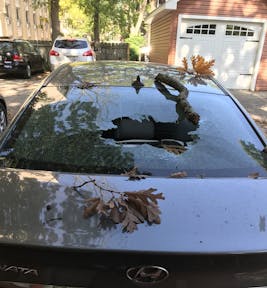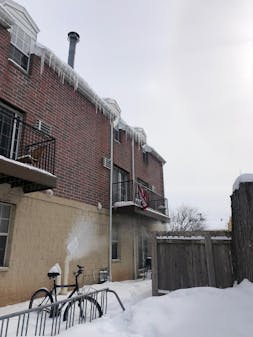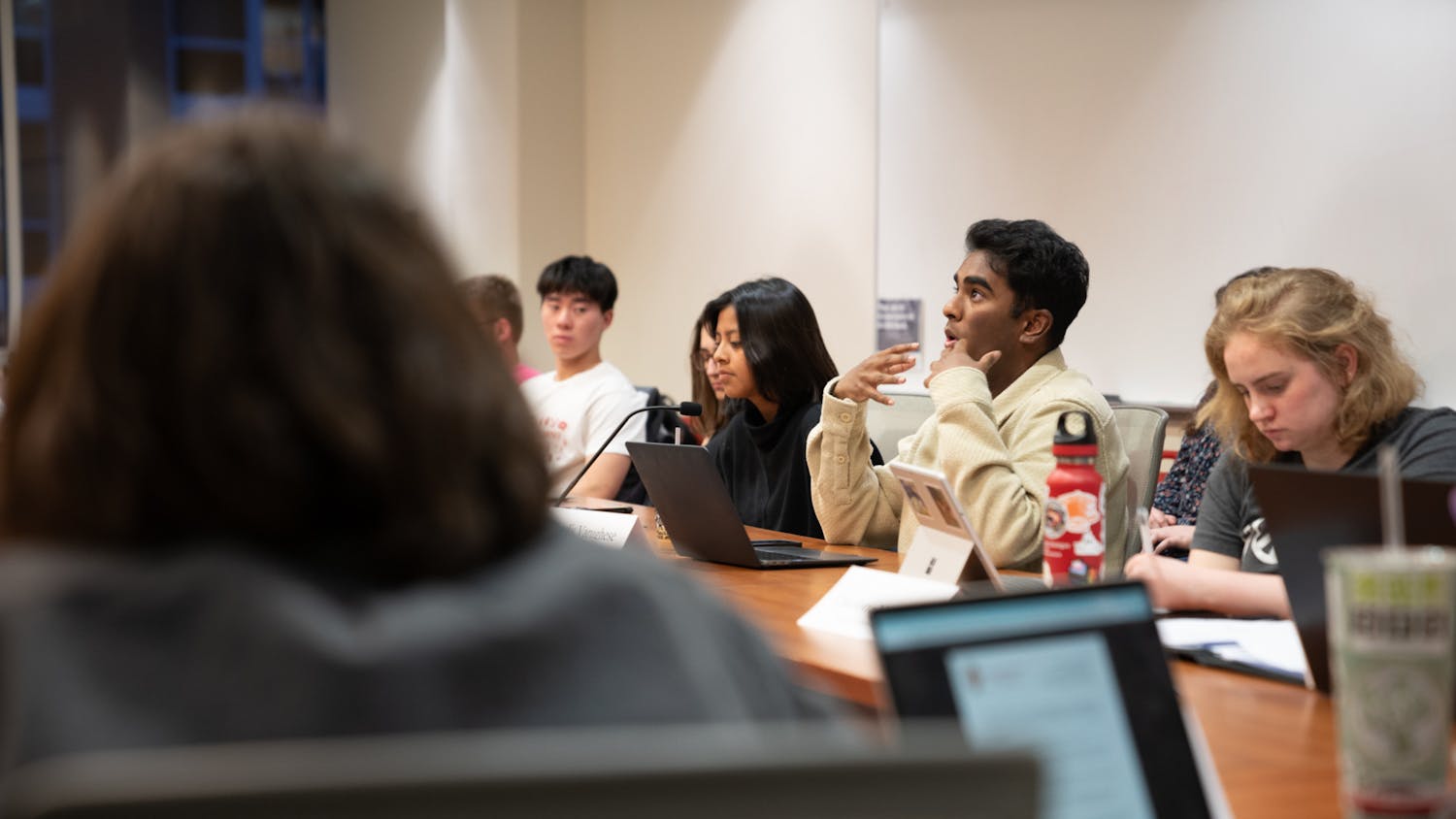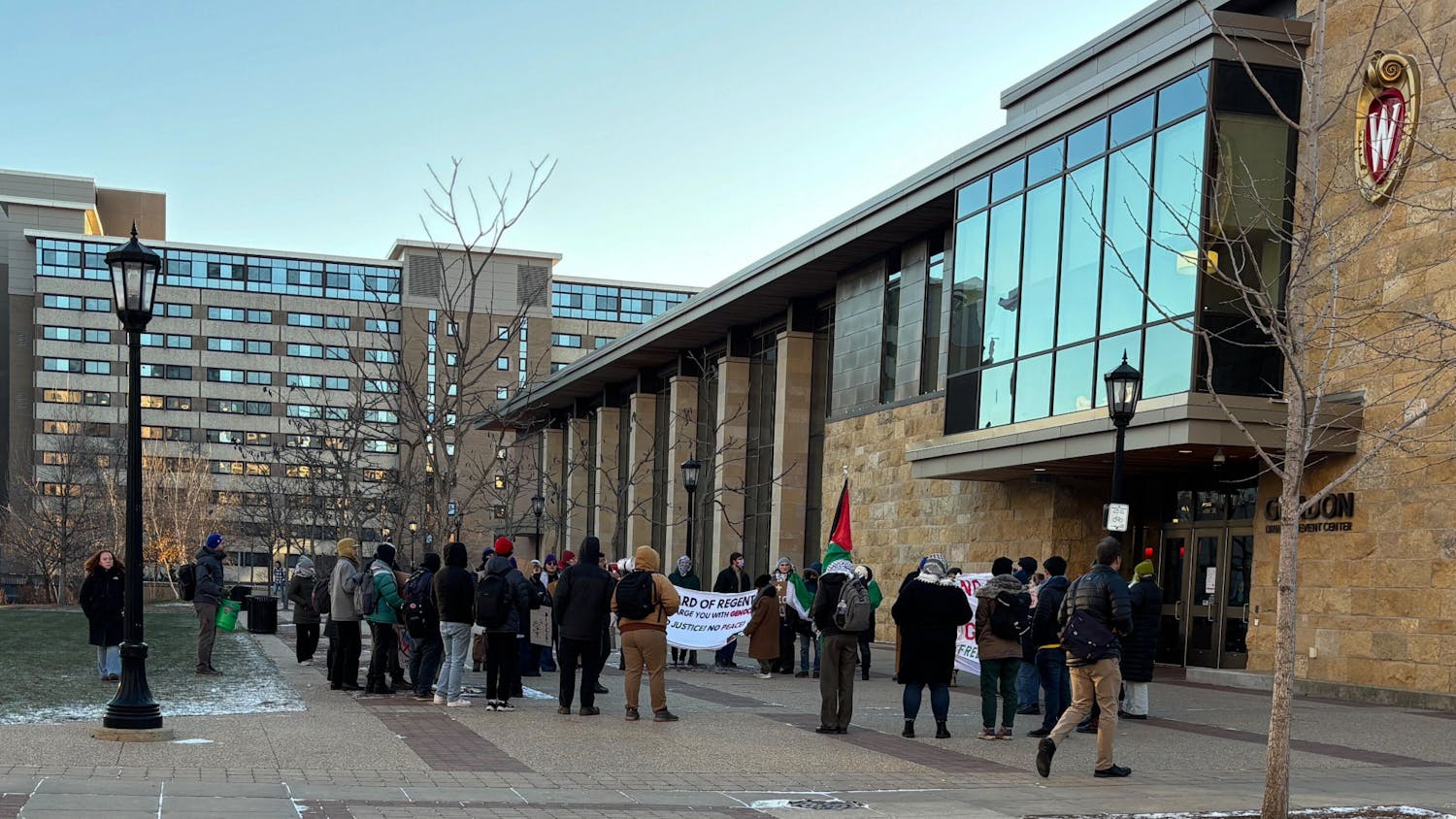Like all problems with the apartment, it started with an inconvenience.
Steve Brown Apartments never assigned spots or painted lines in their parking lot. When UW-Madison senior Gretchen Gerlach came home from work late at night, she would often find that there was no room in the lot that she had paid to park in.
Trees lined the outskirts of the lot and branches hung down over the cars. Gerlach thought this seemed hazardous, and hoped that management would trim the trees back. This past fall though, she found that a branch had plummeted down onto her car’s windshield, shattering it. According to Gerlach, management offered no compensation and refused to trim the trees or maintain the lot. Steve Brown Apartments did remind them to “take good pictures for insurance.”
Every fall, thousands of students begin the search for their next home, scouring listings along the outskirts of the UW-Madison campus. Sprawling neighborhoods of houses and high-rise markets themselves, these seem to students as the perfect college rentals, featuring “spacious rooms,” “updated interiors” and “unique floor plans.” What students often find when they move in, though, is less than advertised.
Gerlach and her boyfriend, graduate student Nick Mathew, moved into a Steve Brown Apartments property this past summer, and have faced constant issues since.
At first, the couple noticed lots of small problems — broken outlets, damaged screens and cracked floors. The more time they spent at home, the more things they noticed. After bats invaded the apartment on three separate occasions, Mathew and Gerlach began to worry for their health. According to Gerlach, Steve Brown Apartments chalked the incident up to “bat season” and showed no real concern. Gerlach said they had to ask repeatedly to ensure that the apartment was properly sealed.
“The only reason our apartment gets fixed is because we’re annoying about it,” Gerlach said. “We shouldn’t have to bug them this much to get anything done.”
According to Gerlach and Mathew, the constant maintenance was a nuisance. Steve Brown Apartments had repeatedly failed to notify them or provide a time window before a maintenance visit. This resulted in frustration, as these visits often interrupt Gerlach’s online classes and Mathew’s remote work.
“We are in a one-bedroom apartment. There’s not really a ton of places to go when maintenance is here,” Gerlach said.
However, the dangerous parking situation was what proved to be “the last straw” for Matthew and Gerlach. “Luckily, my insurance covered it,” Mathew said. “But that branch could have fallen on a person sitting in their car or walking in the lot. It’s not safe at all.”

Mathew took this picture of his smashed windshield to show his insurance company. Steve Brown Apartments took no responsibility and no steps to maintain the parking lot. Image courtesy of Nicholas Mathew.
Steve Brown Apartments is not the only management company not meeting expectations. Unsafe living conditions off campus have long sparked concern among students but not property managers. Tenants deal with a myriad of issues, only to be met with band-aid fixes from property managers.
UW-Madison sophomore Genna Alexander and her three roommates rented a JD McCormick property on the south side of campus. She and her roommates were initially satisfied with the apartment. They like the layout and the location, and the intercom system made them feel safe. On the surface, the property was the perfect home for the four students.
When they signed the lease, however, they never expected to need daily visits from repairmen.
In early February, the apartment’s temperature dropped dramatically. Alexander said the 3rd-floor loft was the worst spot in their chilly apartment. “It gets unreasonably cold in there. I went up once, and it felt like a fridge,” she remarked.
In the state of Wisconsin, it's the landlord's duty to maintain "all equipment under the landlord's control necessary to supply services that the landlord has expressly or impliedly agreed to furnish to the tenant, such as heat," according to Wis. Stat. 704.07(2)(a)2. Knowing this, Alexander and her roommates reached out to their management company to resolve the issue.
Maintenance manually turned on the radiators, warming the apartment for a few hours. Each time the heat went out, the tenants filed another maintenance request. The repairman did the same thing every time. Alexander said that the repairman acknowledged that the issues likely required large-scale repairs, but after multiple attempts to fix the radiator, he resigned to teaching Alexander’s roommate, Gaby Gomez, how to temporarily restart it herself.

According to ATCP 134.04(2)(b)2, landlords in Wisconsin are required to notify tenants before signing a lease if management is unable to keep the property at a constant 67°F year-round, despite Wisconsin’s humid summers and winter temperatures below 0°F. Image courtesy of Cailyn Schiltz.
“It's required three maintenance calls now,” Alexander said. “Typically, it'd be fine, but we're in a global pandemic right now. We don't really want people in and out of our apartment [every day]. With the issues that we've been having, [we] don't feel like [we’re] a priority on the management side.”
Ryne Hodgson, JD McCormick’s Chief Operating Officer, claimed that maintenance calls regarding no or not enough heat are prioritized.
“In regards to structural issues, we recently acquired a majority of our student properties and are assessing the immediate needs of each of these properties,” Hodgson said. “Any issues that have been brought to our attention have either already been addressed or are being scheduled for completion.”
Gerlach and Mathew felt like Steve Brown Apartments took advantage of them, and that the limited quantity of affordable student housing in Madison had turned their landlords into predators. Steve Brown Apartments declined to comment on their maintenance practices.
“All they do is prey on financially-limited college students,” Gerlach said. “There’s this big rush in the fall, pressuring students to sign an expensive lease with people they hardly know. I’ve never seen this outside of Madison, not even in another college town. It’s gross.”
Rental prices near campus do not compensate for the physical state of properties. A studio apartment in Madison can cost well over $1,000 a month. A single room in a multi-bedroom apartment with roommates can be more affordable, depending on the amount of cohabitants — but they still can run between $600 and $800 per month.

Gerlach and Mathew live in an apartment so old that the outlets are not compatible with the appliances. Steve Brown Apartments’ solution was to “daisy-chain'' multiple appliances on to one extender, according to Mathew and Gerlach. Image courtesy of Cailyn Schiltz, via FaceTime screenshot.
On other UW campuses, it’s a different story. In Milwaukee, an average off-campus studio charges just over $700 a month. Roommates could split a three-bedroom apartment and pay about $430 per month. In Eau Claire, studios run for a bit less, but sharing a house or three-bedroom apartment can be even cheaper. Students can expect to pay around $300 per month for a private room in a three-bedroom apartment.
While the renting situation around campus and in the downtown area does not entirely reflect on the surrounding area, the city of Madison’s vacancy rate has long been an issue for residents. A “healthy” rate of vacancy in the United States is considered 5%, yet Madison’s has drifted from 2 to 3% in the past five years. This factor creates an extremely competitive — and pricey — renters market, allowing Madison's Median Gross Rent to balloon to $1,088, $221 over Wisconsin's average.
District 8 Alder Max Prestigiacomo has noticed this alarming trend, and he questioned the UW’s administrative apathy surrounding it. He proposes connecting organizations including UW-Madison’s Neighborhood Law Clinic and the Tenant Resource Center to better meet the housing issues students are facing.
“The university has almost entirely forgotten that students live in off-campus housing. I can attest from conversations with Administrators that this institution — with enormous power in this community — does not see predatory landlords as a concern,” Prestigiacomo said. “My priority has been using the platform of an alder to pull together community organizations to help address this need.”
David R. Sparer, a member of Madison’s Landlord and Tenant Issues Committee, described student housing as “up and down over the past couple of years.”
However, Sparer holds confidence in the resources available to students such as building inspections and rent abatement. Tenants can request that a building inspector look at their property for serious issues. After a set period of time, the landlords must fix the serious issues at hand. If management fails to rectify the situation, tenants are entitled to a hearing to get rent reduced until the issue is resolved. Fees have been waived due to the COVID-19 pandemic, and tenants can use free legal representation from the Neighborhood Law Clinic.
Despite all of the issues, Alexander and her roommates felt some sympathy for property managers in Madison.
“It must be difficult for [JD McCormick] to be responsible for all these people and their homes,” said Alexander. “But, like come on. Do your job.”






